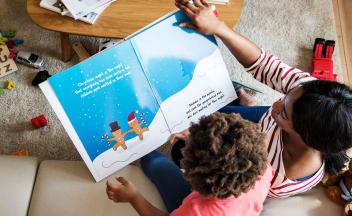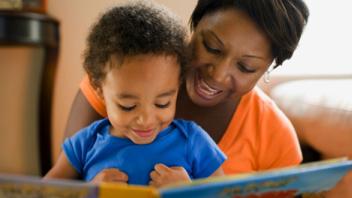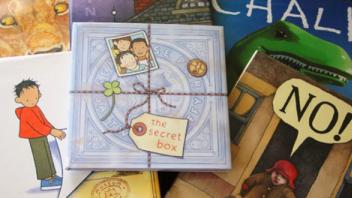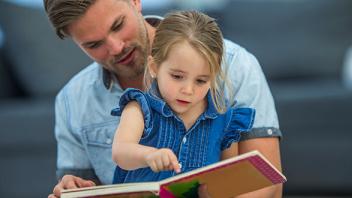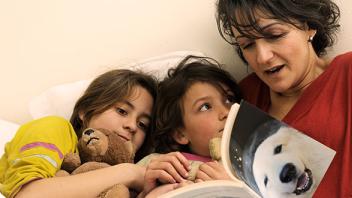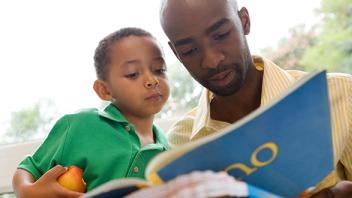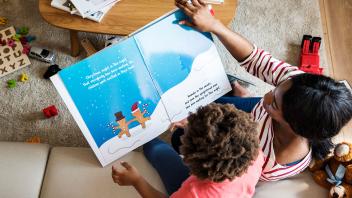Reading aloud is one of the most important things parents can do with their children. Make your read alouds interactive and fun — a conversation between you, your child, and the story. You’ll be introducing rich new words, providing a model of fluent, expressive reading, and letting your child know how wonderful books and reading can be. Reading aloud everyday can become a cherished family tradition.
Benefits of reading aloud
Boosts early literacy skills
Studies have shown that children who are read to regularly are more likely to develop early literacy skills, such as rhyming, letter recognition, and phonemic awareness (hearing the sounds in spoken words). These skills are essential for becoming a skilled reader and success in school.
Helps children develop language and literacy skills
Books provide rich language experiences, and expose kids to vocabulary not used as often in everyday spoken conversation. When children hear new words and phrases, it helps them expand their “word bank” and learn how to use language effectively. Reading aloud helps kids understand text structure — how a narrative story is pieced together, with a beginning, middle, and end. Reading aloud also helps children develop other comprehension skills, such as inferencing, predicting, and understanding characters’ actions and motivations.
Builds background knowledge
When you read all different kinds of books with your child — fiction, poetry, fantasy, science fiction, historical fiction, biography, narrative nonfiction, and informational texts — you help them develop a better understanding of the world around them. As you read, keep the dialogue around the books open and lively, and encourage kids to ask questions. If you don’t know the answer to question, explore more together — through more books, web resources, hands-on activities, and local field trips. It’s a great model for being a lifelong learner!
Offers “windows and mirrors”
Books that reflect different cultures and family experiences give all kids a window into the diverse world we live in. Exposure to a wide range of books helps build both empathy and background knowledge — introducing children to different cultures, time periods, and ways of thinking, and help them develop a broader understanding of the world around them. Other books give kids a chance to see someone who looks like them as an empathetic character, hero, or important historical figure, contributing to a sense of self-esteem.
Reading is a journey. It’s a way to explore new worlds and meet new people. It’s a way to learn about different cultures and ways of life. And it’s a way to expand your imagination.”
Children’s author Kate DiCamillo
Nurtures a love of reading
When children are exposed to books and stories from a young age, they are more likely to develop a love of reading as they get older. That’s because reading aloud helps kids associate books with the joy of spending time with their parents and being read to in a warm and loving environment. And reading takes you places and teaches you things — you’re dipping in and out of real and imagined worlds, meeting interesting characters, learning something new, or deepening an understanding of something you’re already fascinated by.
Promotes social-emotional development
Reading aloud can help children develop social-emotional skills, such as empathy, understanding big emotions, and problem-solving. Many children’s books explore topics such as friendship, conflict resolution, and dealing with difficult emotions. Sharing stories with children can help them learn how to understand and manage their own emotions, as well as how to interact with others in a positive and productive way. This is where conversations around shared stories are so important!
Strengthens family bonds
Reading aloud is a great way to bond with your child. It’s a time when you can relax together, snuggle up, and share a story. It is also a great opportunity for parents and children to talk about the book, share their thoughts and feelings, and ask questions.
Tips on reading aloud
- Choose books that are appropriate for your child’s age and interests
- It’s also important to allow your child to choose books that interest them — especially as they get older
- Make your read alouds interactive and fun
- Talk about the pictures as you read
- Build vocabulary by focusing on and talking about new words
- Connect the story to your child’s world
- Ask questions about the story and encourage your child to ask what they are wondering about
- Make reading aloud a regular part of your routine — just 15 minutes each day can make a big difference in raising a reader
The ABCs of active reading
Featured video
Choosing books to read aloud
Children’s Books
How to Choose Read Aloud Books: Babies to Third Graders
Children’s Books
Great Read Alouds for Kids: Babies to Grade 3
Books & Authors
Book Finder
Parent tips on reading aloud
Reading Aloud
Sharing Wordless Picture Books
Print Awareness
Simple Yet Powerful Things to Do While Reading Aloud
Comprehension
Picture This! Using Mental Imagery While Reading
Reading Aloud
Getting the Most Out of Nonfiction Reading Time
Comprehension
Think Alouds to Build Comprehension
Comprehension
Use a PEER When You Read Aloud
Comprehension
Reading for Meaning with Your Child
Reading Aloud
How to Read With a Wiggly Baby (or Toddler!)
Ed Tech and Digital Media
How to Read an E-Book with Your Child
Kids with special needs
Reading Aloud
Reading Together: Tips for Parents of Children with ADHD
Autism Spectrum Disorder
Reading Together: Tips for Parents of Children with Autism Spectrum Disorder
Browse our reading aloud resource library
Learn more about reading aloud with children through our articles, tips for parents, video, and research briefs. Visit our Reading Aloud section
